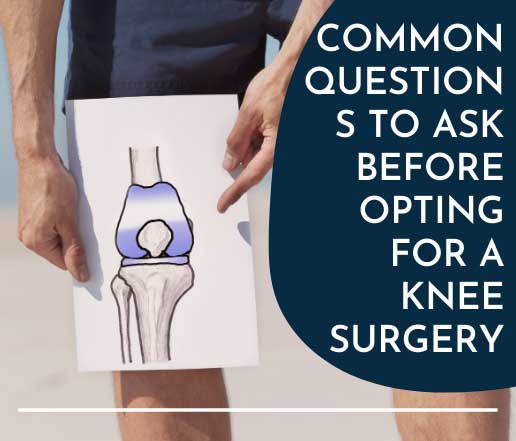
Common questions to ask before opting for a knee replacement surgery.
Undergoing a total knee replacement surgery is not the most preferred choice for anyone. But it is an option that can help you get back “On your feet”. There are a lot of questions in people’s mind before going for surgery, In this article, we will look at a few common questions and answer them.
When will be the right time to undergo a knee replacement surgery?
There is no detailed formula for deciding this, but if you have tried all other forms of non-operative treatments to no avail. You may visit an orthopedic surgeon to carry out tests and diagnose if an operation is needed.
Can I avoid surgery?
Before you consider surgery, your doctor will ask you to try various non-surgical treatments like:
- physical therapy
- anti-inflammatory medication
- acupuncture etc.
Nonetheless, if the symptoms become worse and start to affect your quality of life surgery may be the best option.
What happens during surgery, and how long does it take?
An Incision of around 6-10 would be made by the surgeon over the front of your knee to expose the damaged area of your joint.
The surgeon would next move the kneecap to the side and cuts away the damaged cartilage and a small amount of bone, replace the damaged tissue with new metal and plastic components which mimic the movement of your natural knee.
Most knee replacement procedures take about 60 to 90 minutes to complete.
How does an artificial knee stay intact?
Artificial knee implants are made up of metal and medical-grade plastic called polyethylene.
There are two ways of affixing the components to the bone. One is to use bone cement. The other is a cement-free approach, in which porous coating is done. In some cases, a surgeon may use both methods during the same operation. Top of Form
Bottom of Form
Top of Form
Bottom of Form
Should I worry about anesthesia?
While operating, a Surgeon will administer General, Spinal, or local anesthesia to you to make sure you don’t feel any pain during the operation.
An anesthesia team will decide on the most suitable options for you but most knee replacement surgery is done using a combination of the three. You need not worry about it as in most cases it does not produce any complications.
What will be the consequences of the surgery?
There will be some pain after your operation but your surgery team will do everything possible to keep it minimally providing local anesthesia and nerve blocking. When you leave the hospital, the doctor will give you pain relief medication as pills or syrup.
Following your doctor’s instructions after the operation is the best way to manage pain, and achieve the best result possible.
What should I expect immediately following surgery?
If you have had a general anesthetic, you may wake up feeling a bit confused and drowsy and You will probably have your knee raised to help with swelling.
If a urinary catheter was placed, a medical professional will usually remove it later on the day of your operation or the next day. You may also have to wear a compression bandage or sock around your leg to improve blood circulation.
What is the duration of rehabilitation?
Most people are up and walking within 24 hours with the aid of a walker or crutches, A physical therapist will help you bend and straighten your knee, get out of bed, and ultimately learn to walk with your new knee.
Most people are discharged from the hospital 2–3 days after surgery and therapy continue regularly for several weeks.
It may take you around 3-6 months to fully recover.
How can I prepare my home for recovery?
At the start, Try to avoid Climbing, Walking as much as possible. Try to make arrangements on the ground floor to avoid the stairs. Try to keep your room secluded. Also, Make sure that the handrails are secure and a western toilet setup is available.
Will I need any special equipment?
The use of a CPM machine is recommended by most surgeons in the hospital. It is recommended for application at home as well. You can use it while lying in bed as it helps increase knee motion during the first few weeks after surgery.
It can slow the development of scar tissue and help you maximize your early range of motion
What activities can I do during rehabilitation?
Most patients are advised to rest for approximately 3 weeks after knee replacement surgery.
You will also be able to do low-impact exercises such as riding an exercise bike, walking, and swimming after 6–8 weeks. Your physical therapist may advise you on introducing new activities during this time.
You should avoid running, leaping, and other high-impact activities.
What will be the life span of the artificial knee?
According to research, more than 80 percent of total knee replacements are still functioning 25 years later. However, wear and tear can adversely affect its performance& lifespan.
Younger people are more likely to need correction at some point during their lifetime, mainly due to a more active lifestyle.
Are there alternatives for knee replacement surgery?
Knee replacement surgery is not usually the primary option for treating knee pain.
Here are some suggestions that are good alternatives to surgery:
Weight loss and exercise: Losing even 10 pounds may mean you have 4 times less force pressing on your knees. Walking, Cycling, yoga, etc. Are the best ways of exercise and weight loss.
Physical Therapy: A physical therapist can work out a plan to reduce pain and strengthen the key muscles that affect your knees. They can also work with you to make sure you’re doing the exercises correctly.
Hyaluronic acid injections:
Knee injections of hyaluronic acid are thought to grease the knee joint. This may help improve shock absorption, reduce discomfort, and improve knee mobility.
Medication & Steroid shots:
Over-the-counter (OTC) medication may help manage knee pain. Options include over-the-counter pain relief drugs, topical creams that contain capsaicin, etc.
Acupuncture:
It is an ancient Chinese technique that may help relieve pain. It uses sharp, thin needles to improve the flow of energy within the body. Studies show that acupuncture can help handle knee pain in the short term.
Knee osteotomy
People with a knee deformity or damage to only one side of their knee may benefit from an osteotomy. This procedure is best suited for younger patients.
Walking aids and support
A walking cane or a knee brace is generally advised to help you relieve pressure from the knee and walk properly.
When to Have Total Knee Replacement Surgery?
Many people put off surgery until pain and mobility problems become intolerable. Surgery is, after all, a big deal. It can be costly and disruptive to your routine. Also, there is always a risk.
Before considering surgery, most doctors advise people to look at nonsurgical methods first. If these methods don’t give the required results, it is important to listen to the doctor’s advice and opt for surgery at the earliest.
When does a doctor advise surgery?
Before recommending surgery, an orthopedic surgeon will conduct a detailed examination of your knee using X-rays and possibly an MRI to see inside of it.
They will also go over your recent medical history before deciding whether or not surgery is mandatory.
When is it a good idea to go for the surgery?
If a doctor or surgeon proposes surgery, they will discuss the pros and cons with you while helping you make the decision.
Not having surgery can lead to:
-
-
- Other problems beyond the knee joint
- Weakening and loss of function in muscles and ligaments.
- Increased difficulty engaging in daily activities due to pain and a loss of functionality.
- Complications that could need surgery in the future.
-
Hence it is important to have a detailed chat about when to have the surgery with your doctor.
When is the best time?
If you have heard that you might profit from surgery, it is worth considering doing it sooner rather than later. However, it may not be feasible to have surgery at once. Consider the following factors when deciding on a date:
-
-
- Can you get the date of your preference locally?
- Is your accommodation arranged for moving around easily?
- How much will it cost, and how soon can you get the money?
- Can you get time off work for the duration you need?
- Can you spend time peacefully in recovery? Etc.
-
It is worth considering these questions when deciding on the best time to go ahead.





